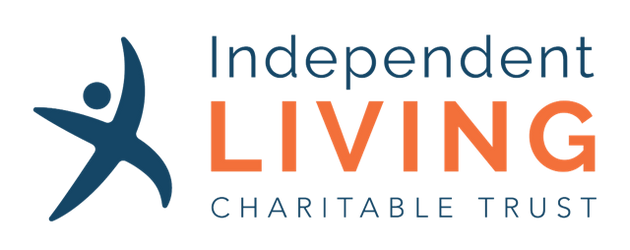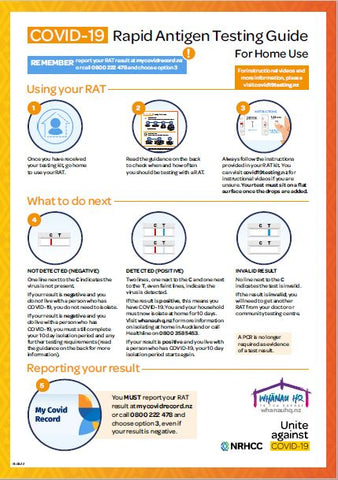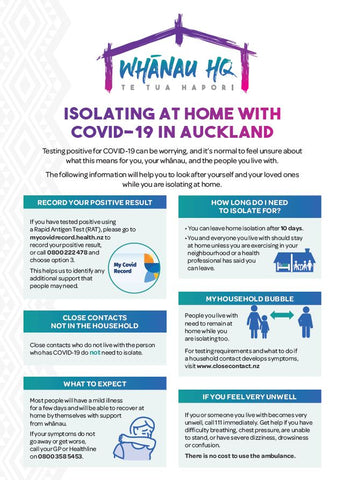
19 April 2023 Update:
COVID-19 continues to circulate in the community. This is a reminder of some of the measures we can all take, and support available, to help minimise its spread, and the spread of other winter illnesses. Recently the Government confirmed that the current COVID-19 rules would remain in place.
This includes the seven-day self-isolation period that applies when a person tests positive - as well as recommendations around mask-wearing, handwashing, cough/ sneeze etiquette and physical distancing in specific situations.
Whaikaha recently released data that confirms that some disabled people are at increased risk of COVID-19, and we are aware that some people in the community are still justifiably concerned.
Please continue to follow public health guidance, use appropriate PPE, and show respect to people who are choosing to wear masks or are taking additional measures to keep themselves safe. Thank you for your ongoing efforts to protect our community.
We would like to remind people of the requirement to wear a facemask when visiting most healthcare services, including disability support services and aged and disability related residential care:
- Mask wearing in healthcare settings – Te Whatu Ora - Health New Zealand
- Wearing a face mask | Unite against COVID-19 (covid19.govt.nz)
Support and information:
Please continue to promote the COVID-19 Disability Helpline information to those who could find it useful.
Call 0800 11 12 13. Text 8988, or email: access@whakarongorau.nz.
The COVID-19 Disability Helpline is available to chat about:
- managing COVID-19 at home
- support and advice for any general health concerns you may have
- accessibility at different vaccination and testing sites
- getting your vaccination safely
- vaccinations and testing at home.
From 8am-8pm a person with lived experience or knowledge of disability answers calls and provides advice or assistance. After 8pm calls will be answered by a trained member of the Healthline team.
The Unite against COVID-19 website also continues to be updated, including with information in alternate formats.
COVID-19 Vaccination Update:
Staying up to date with the recommended COVID-19 vaccinations will help protect you from the risk of serious illness, hospitalisation or death from COVID-19.
The bivalent vaccine has replaced the existing Pfizer COVID-19 vaccine for boosters. The bivalent vaccine causes the immune system to create antibodies against both the original variant of SARS-CoV-2 and Omicron sub-variants and is therefore likely to provide better protection.
Additional booster doses can now be booked if you are aged 30 and over, or at higher risk of severe illness from COVID-19. It must have been 6 months since your last COVID-19 dose or infection.
- Find out more and book your COVID-19 vaccine or booster at BookMyVaccine.nz
Flu vaccination update:
It is recommended that everyone over 6 months old get an annual flu vaccine. Flu vaccines are free for people who meet certain criteria.
More information, including in accessible formats is available here:
Health Workforce Immunisation:
A healthy and resilient health and disability workforce is critical to the successful operation of our health system, especially during the winter season.
This winter, home and community support workers employed by private providers are also eligible for funded flu vaccination. Please make getting a flu vaccination a priority for your teams.
More information here: Eligibility criteria | Influenza - Immunisation & Vaccination Info, NSIG New Zealand
The National Immunisations Directory:
Flu, MMR, Pertussis and Meningococcal vaccination providers have also been mapped across Aotearoa (www.healthpoint.co.nz/immunisation/).
The National Immunisations Directory makes it easier for you to find a service that best meets your needs (immunisation type, locality, access options e.g. no appointment required, and available disability assistance).
The directory includes GP, Community Pharmacies, and COVID Community Health providers; and this information can be used for any national or local immunisation campaign, and digital platforms, using the Healthpoint API.
21 November 2022 Update:
Be prepared for a New Wave of Covid19 Cases
Recent monitoring from the Manatū Hauora – Ministry of Health shows that cases of COVID-19 have been increasing over recent weeks.
Below are details on the COVID-19 support, guidance and assistance relevant to disabled and elderly people.
Antiviral Medicines
Alternate formats | Unite against COVID-19 (covid19.govt.nz)
COVID-19 antiviral medicines can help if someone is at risk of becoming very sick with COVID-19. They reduce the amount of virus in the body to reduce the chance of getting sick enough to require hospital treatment.
Antiviral medicines must be started within 5 days of becoming sick with COVID-19. Have RATs on hand to test if someone is sick.
Eligibility for free COVID-19 antiviral medicines can be found here https://covid19.health.nz/advice/i-have-covid-19/medicines-treat-covid-19
To find the nearest pharmacy that supplies antiviral medicine use the online map. Some clinics do not require a prescription.
0800 Disability Helpline
The COVID-19 disability helpline can provide assistance with vaccines, applying for face mask exemptions, advice on COVID-19 testing, and guidance with managing COVID-19 at home. This includes if your support worker or carer is unavailable. Call 0800 11 12 13. If you are unable to call, you can text them on 8988.
If urgent support is required, and no carer is available, the Healthline will divert the call to a Healthline clinician to re-assess and determine if an ambulance or intervention is required to respond to the person’s urgent needs.
Face mask requirements
See the Ministry of Health and Unite against Covid website for the latest information:
- COVID-19: Use of face masks in the community | Ministry of Health NZ
- Wearing a face mask | Unite against COVID-19 (covid19.govt.nz)
Wearing face masks help prevent the spread of infections like COVID-19 and the flu.
Anyone who visits a healthcare setting (including disability support services and disability-related residential care) but are not a patient nor healthcare worker, must wear a mask.
You can also ask your support workers to wear a mask when they come into your home.
Mask exemptions may still be in place for locations where people are required by law to wear face masks.
Order RATs and Masks for summer & be prepared for the anticipated outbreak
Talk to our team at Independent Living about access to RAT tests and masks
Useful links
The Unite against COVID-19 website has a page dedicated to support and information for disabled people. The website also includes information in alternate formats.
Information for tāngata whaikaha Māori including social media videos, posters and factsheets.
Download the COVID-19 Awhina app and subscribe to COVID-19 key messages
- COVID-19: Āwhina app | Ministry of Health NZ
- COVID-19 health key messages newsletter | Ministry of Health NZ
Health Navigator includes trusted resources on how to manage COVID-19 including symptom diaries, whānau plans, essential items and looking after mental wellbeing.
COVID-19 | Health Navigator NZ
6 April 2022 Update:
Face Covering Communication Cards (exemption cards) - update
Thank you for your patience while we have worked to set up a process to receive and process requests for Face Covering Communication Cards (FCCC).
The Exemptions Team at the Ministry of Health has begun processing these requests from 1 April 2022, when the administration of this function was transferred from Disabled Persons Assembly New Zealand.
All information, including how to resolve mask wearing issues and how to request an FCCC, can now be found here:
COVID-19: Advice for people who are unable to wear a face covering | Ministry of Health NZ
From 11 April 2022, people unable to request an FCCC online can do so over the phone by calling 0800 28 29 26 and select option 2, or text 8988.
Guidance for testing and isolation in community residential care home facilities
Guidance for testing and isolation in community residential support services for people with disabilities providing 24-hour support, is now available.
The guidance includes information for staff, the disabled people they support, and visitors.
Disability community residential care providers | Ministry of Health NZ
Latest Omicron update for providers now available online
The fifth Omicron Bulletin for Disability providers is now available online. Key updates include:
- rapid antigen tests (RATs) can now be used for surveillance of the workforce in residential care settings
- providers are now able to order RATs for the people they support, provided those people meet the eligibility criteria and cannot access a collection centre themselves
- PPE guidance videos are now available for Home Care and Residential Care workers
- PPE and RAT supply has improved – many providers now have adequate volumes
- the updated Covid Protection Framework settings reduce some restrictions on daily life but still protect our population from COVID-19.
Please familiarise yourself with the content of this latest update:
COVID-19 Care in the community: Omicron Updates for disability providers |Ministry of Health
17 March 2022 Update:
Home isolation for positive cases and contacts has been shortened.
Changes to home isolation
If you have COVID-19 or someone in your household does, you now only need to isolate for 7 days and not 10 days.
If you’re a household contact you:
- Need to have a Rapid Antigen Test (RAT) on day 3 and day 7 of the isolation period.
- If you become symptomatic, get a RAT test. If the result is positive, you’ll need to isolate for 7 days from that point.
Information and help if you test positive for COVID-19
- This handy guide from the Ministry of Health tells you everything you need to know about what steps to take if you test positive.
- Our previous update below (dated 11 March) also has some great guides on how to do a RAT Test and isolating at home.
Need assistance home isolating?
- Call the free COVID welfare phone line on 0800 512 337 from 8am to 8pm, 7 days a week, for help with:
- food and essential items delivered to you
- mobile data
- talking to your employer if you’re worried about your leave or pay
- money to pay for urgent and essential costs, like food, medicine and some bills
- connecting you to community, iwi and Pacific groups in your areas.
11 March 2022 Update:
Easy guides to RAT Testing and self-isolation are available.
RATs (Rapid Antigen Tests) are easy to use and now the preferred testing method for testing centres.
This step by step guide shows you how to self-administer the test, reath the results and then what to do if you test positive.
Tested Positive?
This easy self-isolating guide tells you everything you need to know about self-isolation, for the positive case and for their whanau and household members.
17 February 2022 Update:
With Omicron now in the community, do you have a plan should you or others in your household fall ill or are deemed a close contact? This useful guide from the Northern Region Health Centre has useful tips for developing a household isolation plan, a list of key essentials you should ensure you have stocked at home, plus accessible vaccination centres (including low sensory locations).
How we at Independent Living operate in the Red Traffic Light setting
Find out what we have put in place so you can feel comfortable shopping or communicating with us by clicking on this link - How Independent Living operate in the red traffic light setting.
My Covid Record
The traffic light framework: Here is some information to help explain the new proposed Government traffic light framework.
Proof of Vaccination: Find out how to access your COVID-19 vaccination records through My Covid Record, and about digital vaccination certificates
Home Vaccinations: Home Vaccinations as well as a Taxi Service to and from a vaccination centre or drive-through vaccination site are available to those who require. If you need help with your booking or have questions about the vaccine, please call the COVID-19 Vaccination Healthline on 0800 28 29 26 between 8:00am - 8:00pm, 7 days or email NRHCCVAXENQUIRIES@adhb.govt.nz
Group Vaccinations at Royal Oak: Our accessible Conference Room at Independent Living Royal Oak will also be available for those who would like to arrange a small group to be vaccinated together. Simply call us with the details of your group, and we will arrange for vaccinators to assist you on an agreed day. To make an appointment, or to learn more, please call us at 0800 625 100 or email at info@ilsnz.org
***
Independent Living are proud to be supporting the Ministry of Health’s Covid-19 response by being an accredited information partner for our communities.
Below are some useful links – including Covid-19 information in many languages - and frequently asked questions
Vaccine Facts - what are vaccines, are they safe?
Vaccine advice if you have a health condition
Covid-19 Information for disabled people and their family and whanau
How to get a vaccination: phone, email and online
Help and Advice in NZ Sign, Large print, Audio and Braille
Help and Advice in Other Languages
Help and Advice for Pacific Peoples
Useful Covid-19 Resources in Other Languages (downloadable fact sheets and guides)
Vaccination Reactions and Vaccine Survey:
Ministry of Health is monitoring vaccine reactions. Whilst many people have a slight reaction, reactions vary in people and some people react more than others. 10% of those being vaccinated are sent a phone questionnaire.
Learn more about the Vaccine Survey here
If you do have an adverse reaction, you can proactively complete a survey here
If you have any concerns regarding vaccination reactions, contact your health professional or ring the Covid-19 Vaccination Healthline on 0800 28 29 26.




